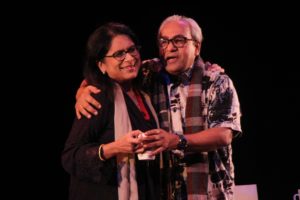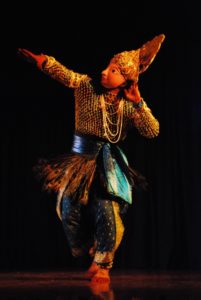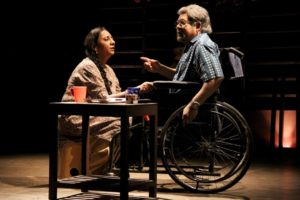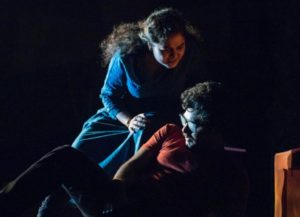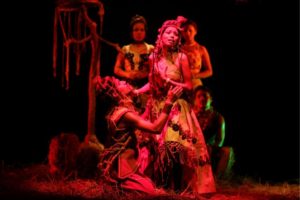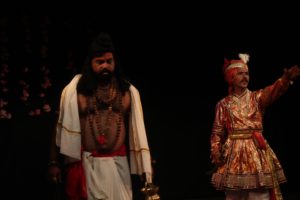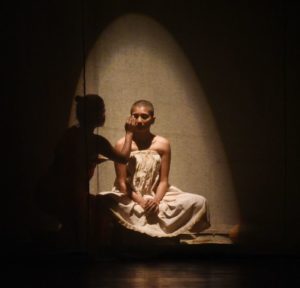Dario Fo & Franca Rame’s THE OPEN COUPLE Director: Sara Zaker
Playwright: Dario Fo & Franca Rame
Director: Sara Zaker
Group: Nagorik Natya Sampradaya, Bangladesh
Language: Bengali
Duration: 1 hr
The Play
The Open Couple, written by Dario Fo and Franca Rame, and adapted by Sara Zaker, is the story of a couple where the husband is having multiple affairs. The wife is going crazy and wants to kill herself each time she discovers her husband’s latest affair with yet another woman. As the play proceeds the husband convinces his wife to accept the concept of an ‘open relationship’. As the story moves on the husband discovers that the wife too has fallen in love with another man. Seeing the wife so happy and in control, makes him very angry and jealous. Now, the husband behaves in the same manner as his wife earlier did i.e. trying to jump off the window of a four-storied building, attempting to shoot himself with a revolver etc. The wife, in turn, now pacifies him and urges him to have a dialogue in exactly the same way he had urged her when she was going crazy.
Director’s Note
I adapted The Open Couple when my family was going through a crisis. My husband was detected with stomach cancer and was treated for more than six months in a foreign land. I took my mind away from all the side effects he had due to chemotherapy by working on this play. Adapting this play gave me relief from stress. I am primarily a performer so writing feeds the actor in me. Even though it was a trying time for the family, I liked to imagine (as a director) that one day this performance would see the light on stage. Also, as an observer of the society and as an actor-director, I felt it was time we articulated the polygamous relationship that permeates all levels of society.
The Director
Sara Zaker has been active on the stage since 1973 as an actress. She belongs to Nagorik Natya Sampradaya, the foremost theatre group of Bangladesh. She was trained at the British Theater Institute in 1981 for Direction. Some of the noteworthy plays directed by her are Ariel Dorfman’s Death and the Maiden, Anton Chekhov’s The Sea Gull, and Dario Fo and Franca Rame’s The Open Couple. She is the recipient of Bangladesh’s second highest civilian award Ekushey Padak.
The Playwright
Dario Fo was an Italian actor, playwright, comedian, singer, theatre director, stage designer, songwriter, painter and political campaigner. The Virtuous Burglar, Archangels Don’t Play Pinball, Mistero Buffo, Accidental Death of an Anarchist, Can’t Play! Won’t Pay!, Trumpets and Raspberries, Elizabeth: Almost by Chance a Woman, The Pope and the Witch are some of his popular plays. In 1997, Dario Fo received the Noble Prize in Literature.
Franca Rame was an Italian theatre actress, playwright and political activist. She was married to Dario Fo who dedicated his Noble Prize to her. In the 1970s, Rame began writing plays of her own, such as Grasso e Bello! and Tutta Casa.
The Group
Nagorik was established in 1968. It won recognition by the Shilpokala Academy and four of its leading actors Aly Zaker, Ataur Rahman, Abul Hayat and Sara Zaker won the second highest National Award Ekushay Padak for their contribution to theatre. Another member of the group, the present honorable minister for culture Asaduzzaman Noor has been awarded the highest National Award the Shadhinata Padak.
| Cast & Credits |
On Stage: Sara Zaker, Ziaul Hasan
Team Leader: Aly Zaker
Light Designer: Md. Nasirul Haque
Light Technician: Mir Badal Rahman
Sound Controller &Production In-Charge: Fakhruzzaman Choudhury
Production Assistant: Nima Rahman
Subtitles: Sara Zaker
Assistant: Ruhe Tamanna Labonyo
Stage Manager: Md. Mahfuzur Rahman
Assistant: Mishu Nasreen
Playwright: Dario Fo & Franca Rame
Director: Sara Zaker
